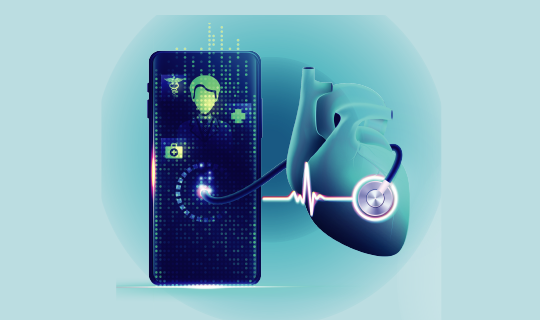The CardioMEMS device uses wireless technology to improve heart failure care.
From smartphones to smart speakers, wireless technology has changed the way we communicate and interact with our devices—and with each other. Now, it’s changing the way health care providers deliver treatment to patients with heart failure.
The CardioMEMS Heart Failure (HF) System is a small and powerful implantable device that measures pulmonary artery pressure, a key metric in the management of heart failure.

“Having the ability to measure a patient’s pulmonary artery pressure remotely on a daily basis is a real game changer for heart failure care,” says Sreeram Grandhi, MD, a fellowship-trained cardiologist with Jersey City Medical Center (JCMC) and a member of RWJBarnabas Health Medical Group.
JCMC began offering CardioMEMS to its patients earlier this year. Since then, says Dr. Grandhi, “We’ve seen encouraging results, especially in terms of improving our patients’ quality of life.”
A Growing Health Concern
Heart failure—which, in its most basic sense, is a chronic, progressive condition in which the heart doesn’t pump enough blood to keep the body functioning as well as it should—affects more than 6 million Americans. And, according to the American Heart Association, that number is expected to increase to 8 million by 2030. Heart failure is also the most common diagnosis among hospitalized patients ages 65 and older and the leading cause of readmissions in people covered by Medicare.
Older adults with heart failure often have additional health conditions, such as diabetes, chronic pulmonary disease, depression, anemia and chronic kidney disease. Medication management is the first line of treatment for heart failure. “Yet medication management is complex,” says Dr. Grandhi, because people with heart failure generally take several prescription medications per day.
A Key Measurement
A common heart failure complication is an increase in the amount of pressure within the pulmonary artery, which carries blood from the heart to the lungs.
“Many years ago, physicians found a link between elevated pulmonary artery pressure and the amount of fluid that builds up in the body,” says Dr. Grandhi. “The more fluid retention a patient with heart failure has, the worse their symptoms become.” Those symptoms include shortness of breath, leg swelling and fatigue.
Historically, the only way to measure pulmonary artery pressure accurately was through a right-heart (Swan-Ganz) catheterization, during which physicians thread a balloon-tipped catheter through the groin and up into the pulmonary artery. “That required a hospitalization,” Dr. Grandhi says. “And it only allowed for a one-time measurement.”
While physicians could adjust a patient’s medication to help improve symptoms based on that measurement, the ever-changing nature of heart failure limited the long-term effectiveness of those modifications.
“Heart failure progresses over time,” says Dr. Grandhi. “While some patients achieve stability with medication management, others have wild fluctuations in symptoms and dosing requirements, especially as their symptoms worsen.”
A Tremendous Advancement
The CardioMEMS HF System, approved by the Food and Drug Administration in 2014, provides continuous pulmonary artery pressure measurements. That gives physicians data they can use to help better manage heart failure and potentially reduce the number of hospitalizations a person may need.
People with heart failure who’ve had at least one heart failure-related hospital admission during the past year are the best candidates for CardioMEMS.
Doctors at JCMC implant the CardioMEMS HF sensor in the pulmonary artery during a right-heart catheterization. “The entire procedure takes less than one hour, and most patients will go home the same day,” says Dr. Grandhi. Once implanted, the sensor immediately begins to monitor pulmonary artery pressure. The device integrates itself into the vessel wall 30 to 60 days after it’s implanted.
To transmit pressure readings from their home to their cardiologist’s office, patients lie down on a special pillow provided by CardioMEMS. “A computer inside the pillow performs a 15-second measurement that is then uploaded wirelessly to a remote monitoring system,” Dr. Grandhi explains. Patients typically take those measurements two to three times a week.
Preventing Hospital Readmissions
Dr. Grandhi and the cardiac team at JCMC have implanted many CardioMEMS devices this year. They’ve already seen benefits of consistent pulmonary artery pressure monitoring.
“We can look at pressures, identify when they start to escalate sooner and adjust a patient’s medication regimen to reverse the trend, all without a patient needing to return to the hospital,” says Dr. Grandhi. Reduced hospitalization helps enhance quality of life for patients with heart failure.
Indeed, clinical studies show that CardioMEMS is associated with both reduced hospitalizations and lower heart failure mortality rates. “It really is tremendous technology,” says Dr. Grandhi, “because it lets patients take a more active role in their health care to create better outcomes.”
Patient-Centered Innovations for Heart Care
Advancements like CardioMEMS are among the many things that make heart care unique at JCMC. “Our team is dedicated to taking the latest academic knowledge and innovation available and applying it directly to better patient care,” says JCMC cardiologist Sreeram Grandhi, MD.
JCMC offers a complete range of cardiovascular and thoracic care options, including coronary artery bypass grafting, mitral valve repair and replacement, noninvasive cardiac imaging and laboratory tests. The JCMC team also performs minimally invasive procedures such as transcatheter aortic valve replacement (TAVR), which allows patients with faulty heart valves to receive a new valve without open heart surgery.
Whoever your heart beats for, our hearts beat for you. To connect with a top cardiovascular expert at Jersey City Medical Center, call 888-724-7123.
